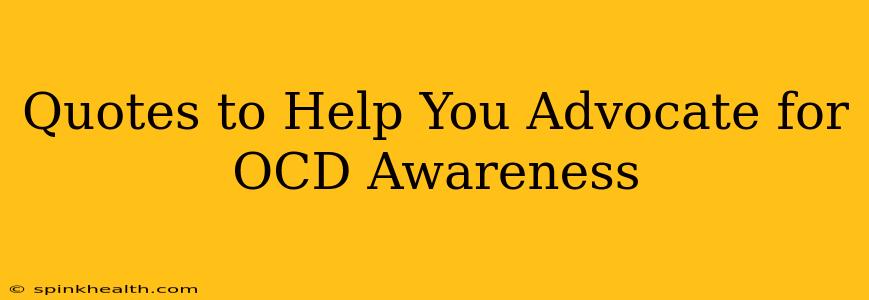Obsessive-Compulsive Disorder (OCD) affects millions worldwide, yet remains widely misunderstood. Effective advocacy requires more than just raising awareness; it necessitates fostering empathy and challenging misconceptions. Powerful quotes can be invaluable tools in this process, sparking conversations and promoting understanding. This article provides a selection of impactful quotes, explores their significance, and offers strategies for using them to advocate for OCD awareness. We'll also address some frequently asked questions surrounding OCD and its impact.
What are some impactful quotes about OCD?
While there isn't a definitive list of "official" OCD quotes, many powerful statements capture the lived experience and highlight the need for increased understanding and support. Here are a few examples, categorized for clarity:
Quotes highlighting the internal struggle:
-
"OCD isn't just about germs and order. It's a relentless battle in your mind, a war against your own thoughts." This quote effectively conveys the invisible and often debilitating nature of OCD, moving beyond common stereotypes.
-
"It's not a choice; it's a compulsion. It's not laziness; it's exhaustion." This quote directly addresses common misconceptions, emphasizing that OCD is a mental health condition, not a character flaw.
-
"The mind is a battlefield, and in OCD, the enemy is yourself." This powerful metaphor encapsulates the internal conflict that characterizes OCD, portraying it as a battle against one's own thoughts and impulses.
Quotes emphasizing the need for understanding and support:
-
"Understanding OCD is the first step towards acceptance and support." This quote promotes empathy and underscores the importance of education in combating stigma.
-
"Compassion, not judgment, is the cure for the suffering of those living with OCD." This quote stresses the crucial role of kindness and understanding in helping individuals manage their condition.
-
"Don't underestimate the power of a kind word or a listening ear for someone battling OCD." This quote highlights the simple yet significant ways in which we can offer support.
How can I use these quotes in my advocacy efforts?
These quotes can be used in various ways to advocate for OCD awareness:
-
Social Media: Share these quotes on platforms like Twitter, Instagram, and Facebook, adding your own commentary and personal experiences. Use relevant hashtags like #OCDawareness, #mentalhealth, and #endthestigma.
-
Presentations and Speeches: Incorporate impactful quotes into presentations and speeches to emphasize key points and connect with your audience on an emotional level.
-
Website and Blog Posts: Use quotes to illustrate points in your written content, adding a personal touch and capturing readers' attention.
-
Fundraising Materials: Include quotes in brochures and fundraising appeals to create a more compelling and impactful message.
-
Educational Materials: Use quotes in educational materials to make complex concepts more accessible and relatable.
What are common misconceptions about OCD?
Many misunderstandings surround OCD, fueling stigma and hindering access to treatment. Here are some common misconceptions addressed:
Is OCD just about cleanliness and order?
No. While some individuals with OCD may experience obsessions related to cleanliness and order, OCD encompasses a wide range of obsessions and compulsions. These can include intrusive thoughts about harm, contamination, religious or moral doubts, and much more.
Can people with OCD simply "snap out of it"?
No. OCD is a complex neurobiological disorder requiring professional treatment. It's not a matter of willpower; individuals with OCD experience intrusive thoughts and overwhelming compulsions that they struggle to control.
Is OCD rare?
No. OCD affects millions worldwide, making it a prevalent and significant public health concern. Early intervention and treatment are essential to improve outcomes.
How can I help someone with OCD?
If you know someone with OCD, offer your support through understanding, patience, and validation. Encourage them to seek professional help from a therapist or psychiatrist specializing in OCD. Educating yourself about the condition and challenging misconceptions is also crucial.
By utilizing impactful quotes, addressing common misconceptions, and promoting understanding, we can collectively create a more supportive and informed environment for those living with OCD. Remember, empathy and education are the cornerstones of effective advocacy.

